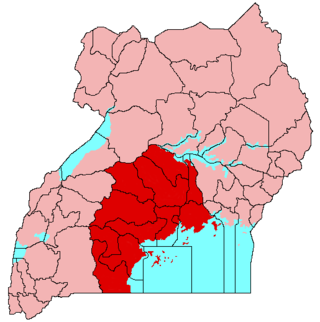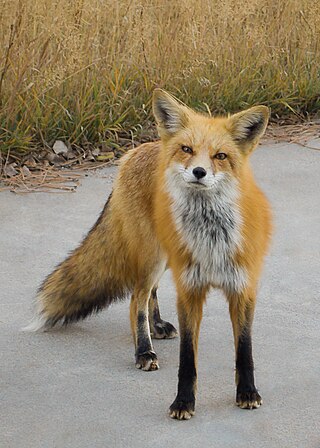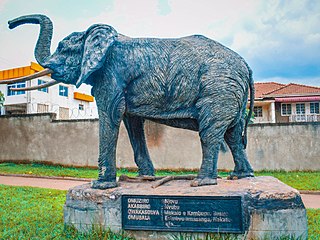
Buganda is a Bantu kingdom within Uganda. The kingdom of the Baganda people, Buganda is the largest of the traditional kingdoms in present-day East Africa, consisting of Uganda's Central Region, including the Ugandan capital Kampala. The 14 million Baganda make up the largest Ugandan region, representing approximately 16% of Uganda's population.

Kabaka is the title of the king of the Kingdom of Buganda. According to the traditions of the Baganda, they are ruled by two kings, one spiritual and the other secular.
Nakibinge Kagali was Kabaka (King) of the Kingdom of Buganda, between 1524 and 1554 AD. He was the 8th Kabaka of Buganda.
Jemba Busungwe was Kabaka (king) of the Kingdom of Buganda between 1564 and 1584. He was the 10th Kabaka of Buganda. His reign is remembered as being kind and gentle.
Sekamaanya Kisolo, also spelled as Ssekamaanya Kisolo, was Kabaka of the Kingdom of Buganda between 1614 and 1634. He was the twelfth Kabaka of Buganda. His reign is remembered as being cruel.
Kateregga Kamegere was Kabaka of the Kingdom of Buganda between 1644 and 1674. He was the fourteenth (14th) Kabaka of Buganda.
This is an article about Mutebi I. Not to be confused with Ronald Muwenda Mutebi II.
Juuko Mulwaana was Kabaka of the Kingdom of Buganda, between 1680 and 1690. He was the sixteenth (16th) Kabaka of Buganda.
Ndawula was Kabaka of the Kingdom of Buganda between 1724 and 1734. He was the 19th Kabaka or king of Buganda. He is remembered as a kind and gentle king.
Namuggala was Kabaka of the Kingdom of Buganda, between 1741 and 1750. He was the twenty-fourth (24th) Kabaka of Buganda. He is remembered as a lovable and merciful ruler.
Semakookiro, also spelled as Ssemakookiro, whose full name is Semakookiro Wasajja Nabbunga, was Kabaka of the Kingdom of Buganda, from 1797 until 1814. He was the twenty-seventh (27th) Kabaka of Buganda.

The Baganda also called Waganda, are a Bantu ethnic group native to Buganda, a subnational kingdom within Uganda. Traditionally composed of 52 clans, the Baganda are the largest people of the Bantu ethnic group in Uganda, comprising 16.5 percent of the population at the time of the 2014 census.
Naggalabi Hill is a cultural, religious and heritage site where the kings of Buganda Kingdom are crowned.

Mpologoma clan is among the clans in present-day Uganda that are believed to have come with Kintu. Mpologoma is a name in Luganda which means lion. Everyone belonging to the Buganda Kingdom belong to a clan, each having a totem whereas others have minor totems which they are not allowed to eat and these totems are guarded jealously. The King of Buganda is also known as "Mpologoma ya Buganda" which means the "lion of Buganda".

The Nvuma clan is believed to be one of the clans that were formed under Kabaka Kato Kintu. It is among the clans in Buganda Kingdom. Nvuma is a name in Luganda which means Pearl.

Lugave Clan is one of the many clans in Buganda Kingdom. Lugave Clan is one of the five clans that were indidgenous to Buganda Kingdom before the coming of Ssekabaka Kato Kintu. Lugave is a Luganda word meaning Pangolin. Members who belonged to the five clans are referred to as Bannansangwa who are the originals. The other Bannasangwa Clans are Fumbe, Ngeye, Njaza, and Nnyonyi Nnyange. The head of the Lugave Clan was called Mukiibi Ssebuko Ssalongo, known at the founding of the Buganda Kingdom.

Nvubu Clan is among the many clans in the present day Buganda Kingdom. It is one of the clans that came to Buganda with Kintu. Nvubu is a Luganda name meaning Hippopotamus. The Nvubu Clan Head is Kayita.

Kibe Clan is among the many clans in Buganda Kingdom. Kibe is a Luganda name which means fox. The Kibe Clan existed during the reign of King Kintu. The Head of the Clan is called Muyige. The Clan seat for Muyige is found at Wantaayi in Kyaggwe(Present Mukono District). The Kibe Clan people first settled in Busujju before they went to Kyaggwe(presently Mukono district).

Njovu Clan is among the many clans in the present day Buganda Kingdom. All members belonging to the Buganda Kingdom belong to a clan each having a totem. Njovu is a Luganda word meaning Elephant.The Head of the Njovu Clan is Mukalo, he also is the founding father of the Clan.

Ngeye Clan is one of the many clans of the present day Buganda Kingdom. Ngeye is a Luganda word which means Colobus Monkey. The Clan Leader is called Hajji Mohamood Minge Kasujja. One of the clans Kintu found already established in Buganda Kingdom. Bakazirwendo Ssemandwa is the grandfather of the Ngeye Clan.










